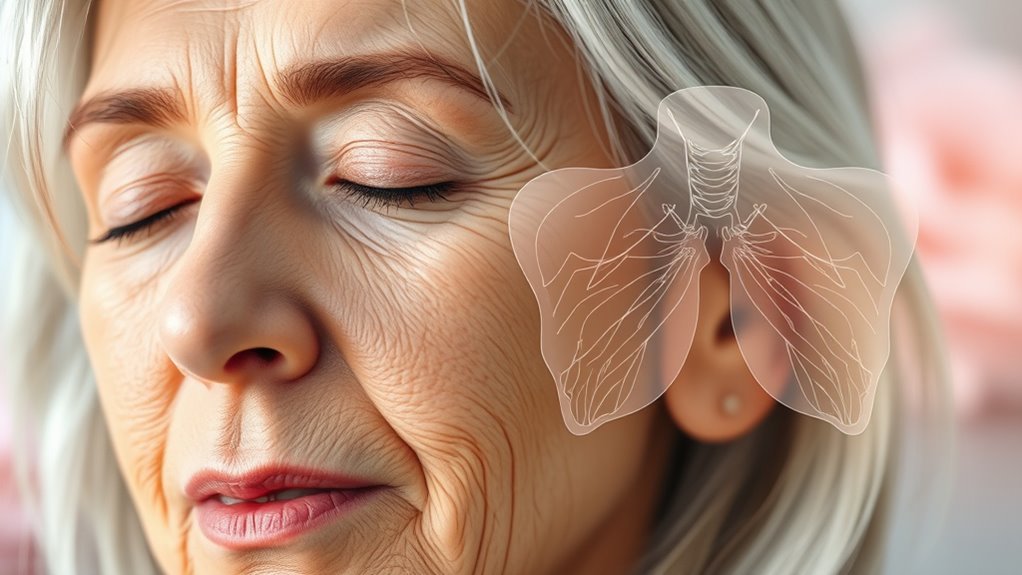During menopause, hormonal fluctuations can disrupt your thyroid function, causing symptoms like fatigue, weight gain, and mood swings. These changes can either overactivate or underactivate your thyroid, with autoimmune conditions becoming more common. Managing these issues is key to feeling your best. If you want to understand how your hormones and thyroid health intertwine during menopause and what steps you can take, there’s more to discover about maintaining your well-being.
Key Takeaways
- Hormonal fluctuations during menopause can disrupt thyroid hormone regulation, leading to thyroid dysfunction.
- Menopause-related immune changes increase the risk of autoimmune thyroid diseases like Hashimoto’s and Graves’.
- Symptoms of thyroid issues, such as fatigue and weight gain, often overlap with menopausal symptoms, complicating diagnosis.
- Metabolic slowdown in menopause may impair thyroid hormone production, affecting overall energy and weight management.
- Regular thyroid testing is essential during menopause to identify and manage thyroid problems early effectively.

As women shift into menopause, many notice changes in their energy levels, mood, and overall health. These shifts are often driven by hormonal fluctuations that occur as your body adjusts to declining estrogen and progesterone levels. But what many women don’t realize is that these hormonal changes can also influence your thyroid health, creating a complex interplay that affects how you feel day-to-day. Your thyroid, a small butterfly-shaped gland in your neck, plays a vital role in regulating your metabolism, energy, and mood. When menopause hits, the hormonal fluctuations can throw your thyroid function into disarray, leading to symptoms that closely resemble menopausal issues—such as fatigue, weight gain, and mood swings.
During menopause, your body undergoes significant metabolic changes, which are closely related to the shifting balance of hormones. These metabolic changes can slow down your body’s natural processes, making it harder to shed excess weight and maintain energy levels. At the same time, your thyroid’s ability to produce hormones may become compromised, either becoming overactive (hyperthyroidism) or underactive (hypothyroidism). Both conditions can contribute to symptoms that feel familiar yet are rooted in thyroid health issues. For instance, an underactive thyroid can cause fatigue, weight gain, cold intolerance, and depression—symptoms that many women associate with menopause itself. Conversely, an overactive thyroid might lead to anxiety, rapid heartbeat, and weight loss, complicating the diagnostic picture further. Additionally, autoimmune conditions such as Hashimoto’s thyroiditis or Graves’ disease, which are linked to autoimmune responses, can also become more prevalent during menopause, further impacting thyroid health. Furthermore, fluctuations in other hormones during menopause can also influence immune system function, making autoimmune conditions more likely to develop or worsen. Recognizing the importance of thyroid testing can help in early diagnosis and management of these conditions.
Understanding the connection between menopause and thyroid health is essential because these changes are often intertwined. The hormonal fluctuations associated with menopause can influence the production and regulation of thyroid hormones, sometimes leading to thyroid dysfunction. In many cases, women with pre-existing thyroid issues may notice their symptoms worsen during menopause. The metabolic changes that come with aging can also mask or mimic thyroid problems, making it tricky to distinguish between menopause-related discomfort and thyroid disease. That’s why regular check-ups and blood tests to monitor thyroid hormone levels become critical during this stage of life.
Frequently Asked Questions
Can Menopause Cause Permanent Thyroid Damage?
You might wonder if menopause can cause permanent thyroid damage. While menopause brings hormonal fluctuations, it doesn’t directly cause permanent damage to your thyroid. However, it can trigger or worsen thyroid autoimmunity, which might lead to thyroid issues over time. If you have a thyroid condition, these hormonal changes could influence your symptoms. Regular check-ups help monitor your thyroid health and prevent potential long-term effects.
Are Thyroid Issues More Common in Postmenopausal Women?
You might notice thyroid issues are more common in postmenopausal women due to hormonal fluctuations that affect thyroid function. These changes can influence your overall health, including bone density, increasing your risk for osteoporosis. As hormone levels shift, your thyroid may become overactive or underactive, making it important to monitor symptoms and get regular check-ups to maintain your health and prevent complications.
How Does Hormone Replacement Therapy Affect Thyroid Function?
Hormone therapy can influence your thyroid response, as it introduces hormones that may interact with your thyroid function. You might notice changes in thyroid hormone levels or symptoms, depending on how your body reacts. It’s crucial to monitor your thyroid health closely while on hormone therapy and work with your healthcare provider to adjust treatment if needed, ensuring your thyroid stays balanced and your overall health remains ideal.
What Are Early Signs of Thyroid Problems During Menopause?
You might notice thyroid symptoms like fatigue, weight changes, or mood swings early on. These signs can be subtle but are important for menopause management. Keep an eye out for irregular heartbeat, cold sensitivity, or hair thinning. Recognizing these early signs helps you seek medical advice promptly, ensuring better health during menopause. Managing thyroid health effectively supports your overall well-being during this passage.
Can Diet Influence Thyroid Health During Menopause?
You might think you’re fighting a losing battle, but diet can truly influence your thyroid health. By adopting nutritional strategies like eating iodine-rich foods, selenium, and zinc, you support your thyroid function. Dietary supplements can also help fill nutritional gaps. Stay mindful of goitrogens found in some foods, and balance your diet for ideal thyroid health. Small changes can make a big difference in how you feel day-to-day.
Conclusion
So, there you have it—menopause and thyroid health, best friends or secret enemies? As you navigate hot flashes and mood swings, don’t forget your thyroid might be throwing its own tantrums behind the scenes. Keep an eye on those symptoms, chat with your doctor, and remember, your thyroid isn’t just a tiny gland; it’s the unsung hero (or villain) in your menopausal saga. Stay vigilant, and keep laughing—because what’s life without a little thyroid drama?









